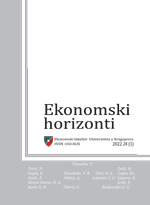MODELLING SECTORAL SENSITIVITY TO MACROECONOMIC SHOCKS: EVIDENCE FROM NIGERIA
Joshua Adeyemi Afolabi1, Blessing Ufuoma Olanrewaju1 and Wasiu Adekunle2
1Nigeria Institute of Social and Economic Research, Ibadan, Nigeria
2Nigeria Economic Summit Group, Lagos, Nigeria
The Nigerian economy has been repeatedly hit by macroeconomic shocks, primarily owing to its over-reliance on crude oil and poor resource management. Given the limited resilience capacity of Nigeria’s economic sectors, this study examined the sensitivity of these sectors to macroeconomic shocks using the Vector Autoregression (VAR) and the Vector Error Correction (VEC) models in whose frameworks the study was carried out for the period between 2010Q1 and 2021Q4. The findings revealed the high responsiveness of the services and agricultural sectors to fiscal shocks, as well as the high sensitivity of the industrial sector to interest rate shocks. Also, the services sector was found to be more resilient to oil price shocks than the other sectors. Therefore, this study advocates for developing strategies to boost sectoral productivity and skillfully blend the fiscal and monetary policies so as to cushion the effects of macroeconomic shocks. Overall, this study provides the evidence of the sectoral effects of macroeconomic shocks in Nigeria.
Keywords: macroeconomic shocks, vector autoregression, vector error correction, industrial sector, agricultural sector, service sector
JEL Classification: C22, E23, E52, E62




